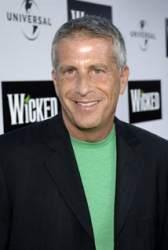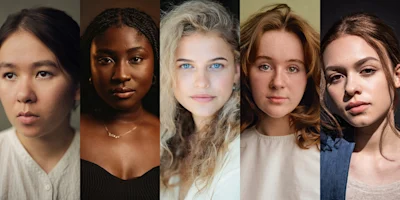
An interview with Marc Platt
Following from our interview with director Rob Marshall we recently sat down with Broadway and film producer Marc Platt who was part of the producing team behind the film 'Into the Woods'. He is currently represented on Broadway with the musicals Wicked and If/Then as well as working on new film adaptations of Little Shop of Horrors and an original film musical The Egg and the Spoon which will feature music by Jeanine Tesori.
We spoke to Marc about the nature of producing on both stage and screen as well as the current trend for movie musicals and his thoughts on why fairy tales and fantasy subjects continue to thrill audiences. With Disney's upcoming live action musical adaptation of Beauty and the Beast which will star Emma Watson as 'Belle', proving that a title can go from movie, to musical and back again, we asked about the state of the Wicked movie and why it's so important to the creative team to get it right...
DOH: Dom O'Hanlon
MP Marc Platt
DOH: Firstly I want to ask you about Producing 'Into the Woods'. Did the connection with Disney ever worry you in terms of the musical distorting and almost re-writing their beloved stock of characters and how that would affect the film?:
MP: It didn't worry us in the sense that Disney wanted to make the movie. Everyone was aware of it. The challenge is, with or without Disney, how do you render the piece accessible enough for children? It is an instructive story ABOUT parents and children, just as the original Fairy Tales are. Stephen and James's great idea takes these stories that are used by parents to prepare children for the evil in the world. Children today in the world of social media are confronted with evil all the time. That's what makes the piece so prophetic and relevant. How do you make it accessible? Disney's 'brand' generally means Happily Ever After - how do you convince an audience because it's Disney and their audience that it's still 'Into the Woods'? There was a huge 'hoopla' before the film came out, but at the end of the day the film still speaks for itself.
DOH: Where is the movie musical now? Does it continue to have a place in the industry?
MP: There certainly IS a place for it, mainly because so many are successful. Not every single one is successful though. I think we're living in a world where we look at the story telling which is part of the culture and I think that the thought of people singing is part of how stories are told - television, film, there is a place for it and acceptance of it. There will always be people who are horrified by the thought of it - 'Into the Woods' takes a bit of a turn, the songs are not musical numbers, it's not 'Chicago' or 'Dreamgirls' - songs are scenes, dramatic scenes set to music. I think with that another wall falls down. I think audiences are very comfortable with musical storytelling and I think actors LOVE being in musicals. Hopefully you find the ones who sing really well. All actors want to exercise different skills, its very fun. As an audience there is an intrigue over who can sing, Can so and so sing? I want to see that! That inspires success. The fact that 'Into the Woods' is so successful can only mean that other musical films are sure to follow.
DOH: Many of us are awaiting the film version of 'Wicked'. Do you have a specific time scale for the project?
MP: The process and development of the movie has begun in earnest and it will happen when the material is at a place where we feel, as the creators, that the adaptation of it will be as satisfying as a film as it is in a theatre. That could be tomorrow or it could be a year from now - I don't know the answer to that, it IS in the process, we have just set the bar really high. We're not shooting to a release date - we want the film to be unique and satisfying as the stage experience which is still terribly successful.
DOH: Into the Woods and Wicked share many similar aspects. What is it about fantasy musicals that resonates so well with audiences?
MP: Fantasy lends itself so well to musicalisation. They also share familiar characters and we the audience take a journey with them as they take an unexpected turn and that's intriguing. We all know The Wicked Witch or Cinderella, and the thought that there may be another story is fascinating.
DOH: What are the main differences working as a producer of both stage and screen?
MP: I'll start with the similarities - telling the story is telling the story. Facilitating creative people and unearthing a vision is very similar. What's different now are the specifics - how you design it, how a live stage show can be edited is very different to the movie world. The businesses are different - movies are all about how can we make the first weekend so strong that it has life to it, whereas a well produced show gives itself time to find itself an audience.
DOH: That's what has been remarkable about 'If/Then' and full credit for letting it find its audience. This year has been so ruthless on Broadway with shows closing so suddenly without that time to develop - do you see that as the future?
MP: Look, I think good material usually finds an audience. You have to be smart about the kind of stories you bring to stage and screen - if you're going to bring something that doesn't have as broad a 'hook' to it, doesn't mean you shouldn't do it but you should do it small so that you can afford to find an audience and it doesn't require huge audiences to sustain it. There is some smart producing to be done - each story is different - each journey of the story is different, some should be made on a large scale - some should be make on a small scale.
DOH: This year I was struck by the sheer amount of producers attached to projects - Gentleman's Guide for example after it won the Tony proved that. Are the David Merrick's dead and buried?
MP: There are lots of prolific creative producers out there. I only like to produce as a 'creative producer' which means that if I'm going to produce my hands are going to be in everything - from the notes that are written to the words that are said and the set on stage, which is really different to producers who are really 'presenters'. Those are the ones who write cheques. They are very necessary and valuable to the industry and I applaud them all - I wouldn't put my name on something by writing a cheque. I have written cheques, because I wanted to be an investor, but my name's not on there. I've partnered with David Stone and he's a brilliant producer - Scott Rudin's a brilliant producer, there's Cameron [Mackintosh] who I'm about to go see - there ARE visionary and smart creative producers out there but also a large number of 'presenters' who get their names out there. Like I said, they're valuable component to the process, but its credit is one thing - every contribution is valid.
DOH: Aside from Wicked, what else are you working on?
MP: I have a lot of ideas and they'll be coming soon. I'm working with amazing talent different types of composers. From Scott Frankel and Michael Korie to Adam Guettel. Musicals take time to gestate - but my next wave is up and coming. For film I'm interested in pursuing not only adaptations - I'm doing 'Little Shop of Horrors' for example - but also original movie musicals. I've just optioned the book for Universal called 'The Egg and the Spoon' written by Gregory Maguire who wrote Wicked - that book is being turned into a FILM musical. Greg Mason is writing the screenplay, Jeanine Tesori is writing the music. So I've got projects going every which way so stay tuned!
Dom O'Hanlon
Sub-Editor at Londontheatre.co.uk & NewYorktheatreguide.com
Originally published on









